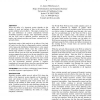Free Online Productivity Tools
i2Speak
i2Symbol
i2OCR
iTex2Img
iWeb2Print
iWeb2Shot
i2Type
iPdf2Split
iPdf2Merge
i2Bopomofo
i2Arabic
i2Style
i2Image
i2PDF
iLatex2Rtf
Sci2ools
107
click to vote
HT
1999
ACM
1999
ACM
Control Choices and Network Effects in Hypertext Systems
When the utility of a hypertext system depends on the number of users and amount of data in the system, the system exhibits network effects. This paper examines how the core differences in control assumptions between monolithic hypertext systems, open hypermedia systems, and the Web, lead to different incentive structures for readers and content providers and hence varying levels of network effects. Significant results of this analysis are as follows. First, lack of control over the data in a hypermedia system, combined with a large-scale distribution infrastructure is a key aspect of achieving network effects, since this control choice affords large numbers of readers. Second, examination of network effects from the Web and monolithic hypermedia systems suggests that control over the user interface is a key contributor to network effects, since it provides a more pleasant experience for readers, and allows for more control over the presentation by content providers. Finally, control ...
Related Content
| Added | 02 Aug 2010 |
| Updated | 02 Aug 2010 |
| Type | Conference |
| Year | 1999 |
| Where | HT |
| Authors | E. James Whitehead Jr. |
Comments (0)

